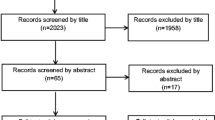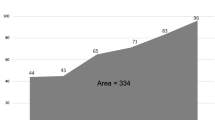Abstract
An experiment of progress testing for postgraduate medical education was evaluated for the psychometric properties and evaluation utilities of its outcome. Psychometric analysis emphasized reliability, construct validity, exam structure, and equating quality, while analysis of evaluation value focused on growth trajectories of several cohorts of residents. The analyses concluded that progress testing for postgraduate education was feasible. The value of progress testing for postgraduate medical education assessment was unique and promising.
Similar content being viewed by others
References
Adams, R. & Wright, B. (1994). When does misfit make a difference? In M. Wilson (ed), Objective Measurement: Theory into Practice, Vol. 2. Norwood, NJ: Ablex Publishing.
Arnold L. & Willoughby T.L. (1990). The quarterly profile examination. Academic Medicine 65: 515–516.
Blake, J.M., Norman G.R. & Keane, D.R. et al. (1996). Introducing progress testing in McMaster University's problem-based medical curriculum: Psychometric properties and effect on learning. Academic Medicine 71: 1002–1007.
Gordon, M. (1997). Cutting the Gordian knot: A two-part approach to the evaluation and professional development of residents. Academic Medicine 72: 876–880.
Marshall, J. (1993). Assessment during postgraduate training. Academic Medicine 68: S23–S26.
Norcini, J.J., Maihoff, N.A., Day, S.C. & Benson, J.A., Jr. (1989). Trends in medical knowledge as assessed by the certifying examination in internal medicine. JAMA 262: 2402–2404.
Norcini, J.J., Shea, J.A., Day, S.C. & Benson, J.A., Jr. (1991). Trends in the medical knowledge and clinical competence of graduates of internal medicine. Academic Medicine 66: S58–S60.
Smith, R.M. (1982). Detecting Measurement Disturbances with the Rasch Model. Unpublished doctoral dissertation, University of Chicago.
Verwijnen, M., Imbos, Tj. & Snellen, H. et al. (1989). The evaluation system at the medical school of Maastricht. In H.G. Schmidt, M. Lipkin, Jr., M.W. de Vries & J.M. Greep (eds.), New Directions for Medical Education. New York: Springer-Verlag.
Wright, B.D. & Stone, M.H. (1979). Best Test Design. Chicago, IL: MESA Press.
Wright, B.D. & Linacre, M. (1996). BIGSTEPS: Rasch-model computer program [Computer software, Version 2.25]. Chicago, IL: MESA Press.
Author information
Authors and Affiliations
Rights and permissions
About this article
Cite this article
Shen, L. Progress Testing for Postgraduate Medical Education: a Four-Year Experiment of American College of Osteopathic Surgeons Resident Examinations. Adv Health Sci Educ Theory Pract 5, 117–129 (2000). https://doi.org/10.1023/A:1009889723165
Issue Date:
DOI: https://doi.org/10.1023/A:1009889723165




